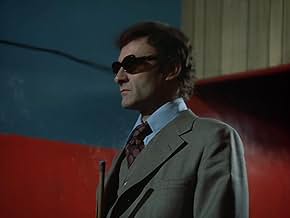A police commissioner provides a false alibi for a wife killer, but then expects an alibi in return.A police commissioner provides a false alibi for a wife killer, but then expects an alibi in return.A police commissioner provides a false alibi for a wife killer, but then expects an alibi in return.
Arlene Martel
- Salesgirl
- (as Arlene Martell)
- Director
- Writers
- All cast & crew
- Production, box office & more at IMDbPro
Storyline
Did you know
- TriviaThe funeral home featured in the stock shot is not in California. It is the luxurious Ephrussi de Rothschild villa and gardens in Saint-Jean-Cap-Ferrat on the French Riviera. This location is notably featured in the James Bond film Never Say Never Again (1983).
- Goofs(at around 41 mins) Mark Halperin (Richard Kiley) refers to the murder plot as a "Quid Quo Pro" instead of as a Quid Pro Quo.
- Quotes
Mark Halperin: [to his wife] Darling, if you're embarrassed by all your millions, why don't you just sign them over to me? They wouldn't embarrass me in the least.
- ConnectionsReferences Strangers on a Train (1951)
Featured review
This series - particularly the earlier episodes - is certainly one of the best ever. I missed this particular one when originally aired, but saw it several years later, and then again recently. (Like Andy Griffith's "Andy Griffith Show" and "Matlock," this is a program for which one is grateful for the reruns available on cable today.)
This particular program, though, is the one I'd probably label my all-time favorite - among many, including those with the ubiquitous Columbo "killers," Jack Cassidy, George Hamilton, etc.
One of the greatest mistakes in the entire history of film was the casting of Peter O'Toole in the lead for "Man of La Mancha," rather than Richard Kiley, whose Broadway performance in this role was among the most acclaimed, ever. Kiley was an immensely- and diversely-talented actor, who should be more prominently recognized and remembered among his peers than he is.
His portrayal as the egotistic, manipulative, greedy deputy police commissioner, and the villain of this episode, is outstanding. The "shtick" of this series, of course, included the usually smooth, urbane, well-dressed, cosmopolitan qualities of the villains - contrasted markedly with Columbo's being the opposite in all of these.
This aspect is certainly apparent here - and the only somewhat puzzling part of the story is the seeming absence of Kiley's knowledge of Columbo's abilities beneath his sloppy exterior - and he would have certainly seen the records of the department certifying the lieutenant's significant abilities.
The main paradox in the history of "Columbo" was the ease with which he seemed to be able always to remain "under the radar," both within the department (even with those with whom he was most closely associated) and on the outside - despite having had to possess a better record for detection and solution of serious crimes than Sherlock Holmes, Hercule Poirot and Sam Spade - combined.
There is no way a review of a "Columbo" episode could be a spoiler. We know from the outset that Kiley is the villain here - however, Columbo's inevitable foiling his devious, wily superior, is perhaps the most clever in the history of this long series.
This particular program, though, is the one I'd probably label my all-time favorite - among many, including those with the ubiquitous Columbo "killers," Jack Cassidy, George Hamilton, etc.
One of the greatest mistakes in the entire history of film was the casting of Peter O'Toole in the lead for "Man of La Mancha," rather than Richard Kiley, whose Broadway performance in this role was among the most acclaimed, ever. Kiley was an immensely- and diversely-talented actor, who should be more prominently recognized and remembered among his peers than he is.
His portrayal as the egotistic, manipulative, greedy deputy police commissioner, and the villain of this episode, is outstanding. The "shtick" of this series, of course, included the usually smooth, urbane, well-dressed, cosmopolitan qualities of the villains - contrasted markedly with Columbo's being the opposite in all of these.
This aspect is certainly apparent here - and the only somewhat puzzling part of the story is the seeming absence of Kiley's knowledge of Columbo's abilities beneath his sloppy exterior - and he would have certainly seen the records of the department certifying the lieutenant's significant abilities.
The main paradox in the history of "Columbo" was the ease with which he seemed to be able always to remain "under the radar," both within the department (even with those with whom he was most closely associated) and on the outside - despite having had to possess a better record for detection and solution of serious crimes than Sherlock Holmes, Hercule Poirot and Sam Spade - combined.
There is no way a review of a "Columbo" episode could be a spoiler. We know from the outset that Kiley is the villain here - however, Columbo's inevitable foiling his devious, wily superior, is perhaps the most clever in the history of this long series.
Details
- Release date
- Country of origin
- Language
- Also known as
- Meine Tote - Deine Tote
- Filming locations
- 355 S Muirfield Rd, Los Angeles, California, USA(Halperin residence)
- Production company
- See more company credits at IMDbPro
Contribute to this page
Suggest an edit or add missing content


















